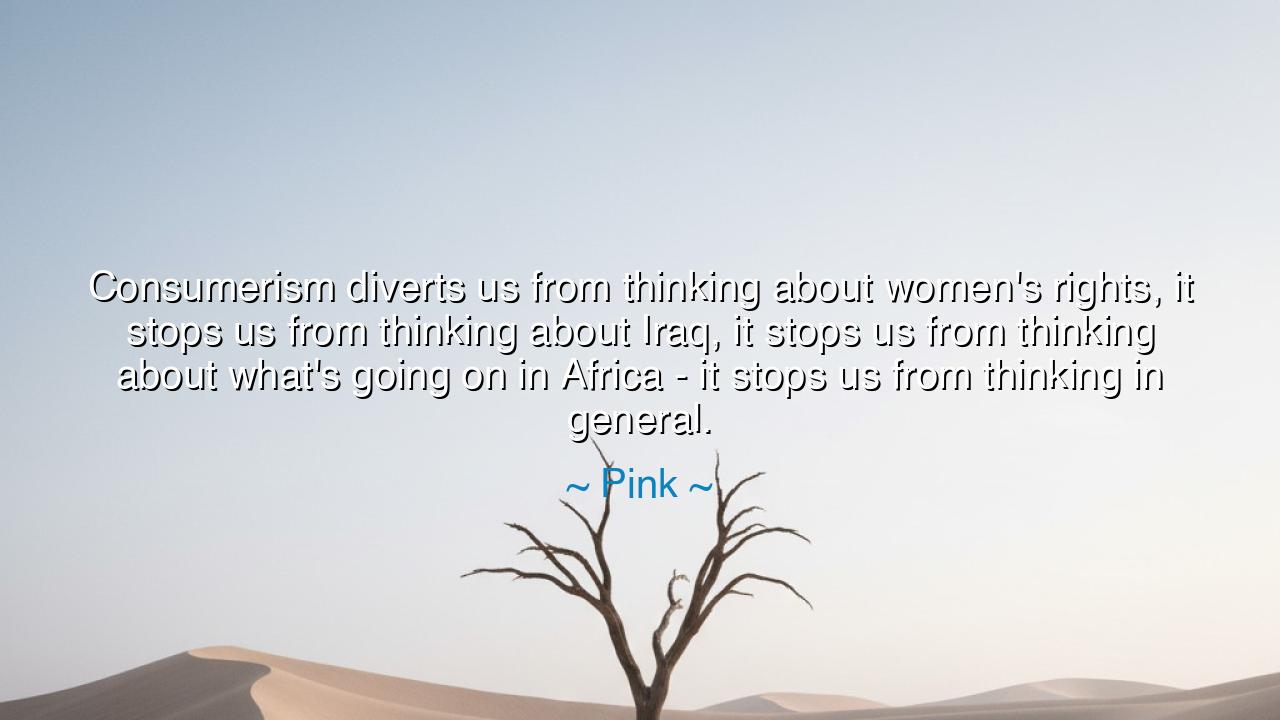
Consumerism diverts us from thinking about women's rights, it
Consumerism diverts us from thinking about women's rights, it stops us from thinking about Iraq, it stops us from thinking about what's going on in Africa - it stops us from thinking in general.






The words of Pink — “Consumerism diverts us from thinking about women’s rights, it stops us from thinking about Iraq, it stops us from thinking about what’s going on in Africa — it stops us from thinking in general.” — ring like a warning bell in a marketplace filled with noise and glitter. She unmasks consumerism not merely as the pursuit of goods, but as a great distraction, a spell that numbs the mind and blinds the heart. When people are lured into endless desire for possessions, they forget the cries of justice, the wounds of war, and the suffering of the oppressed.
The meaning of this teaching is that consumerism steals not only wealth, but awareness. It seduces humanity into believing that comfort and novelty are the highest goals, while matters of life and death — women’s rights, the bloodshed in Iraq, the struggles of Africa — fade into silence. By keeping the mind endlessly busy with wants, the system prevents people from thinking critically, from acting boldly, from caring deeply. It is not only an economic force, but a spiritual one, designed to lull societies into complacency.
History reveals this truth. In the days of Ancient Rome, the emperors provided “bread and circuses” to distract the people from corruption and tyranny. The crowds, fed and entertained, forgot the decay of their republic until it was too late. Just as Roman circuses dulled the minds of citizens, so too does consumerism dull the modern soul, trading awareness for amusement and justice for convenience. Pink’s words echo the same ancient warning: when people stop thinking, they become easy to rule.
The origin of her words lies in the modern age, where voices for change struggle to be heard beneath the roar of advertisements and the flood of trivial distractions. Pink, as both artist and activist, saw that music and culture could either awaken the spirit or serve as another opiate. By naming consumerism as the enemy of thought, she calls her listeners back to their true responsibility: to resist distraction and engage with the pressing struggles of humanity.
Therefore, O seekers of wisdom, remember this: freedom is not only won on battlefields, but in the quiet war for the human mind. Beware of the chains of consumerism, which glitter like gold but bind like iron. Do not trade your awareness for shallow pleasure, nor your compassion for empty indulgence. As Pink teaches, to think is itself an act of resistance, and to remember the struggles of the world is to keep alive the flame of justice. Only by refusing the narcotic of distraction can a people remain awake, and only the awake can change the world.






HNNguyen Hoang Ngan
Pink brings up a crucial point about how consumerism can blind us to the struggles happening globally. How many of us really stop to think about issues like Iraq or women’s rights when we’re constantly bombarded by advertisements and social media trends? Is it possible to be mindful of both our consumer habits and the world’s larger issues at the same time? What steps can we take to reduce our consumer impact while also raising awareness?
NKLuong Nhan Khanh
This quote from Pink really makes me question our priorities. How can we be so caught up in buying things when there are human rights abuses and wars going on around the world? It almost feels like consumerism is a shield to protect us from the harsh realities of the world. Can we ever truly make a difference if we continue to live in this bubble, or is this just the way our modern society is structured?
GGiang
I can’t help but agree with Pink—consumerism distracts us from so many important issues. How often do we see people more concerned with the next new gadget than with human rights or global conflicts? The problem is that it's hard to break free from consumer culture when it’s so deeply ingrained in every part of our lives. How can we encourage people to look beyond their immediate desires and become more aware of global struggles?
TATram Anh
Pink's quote really resonates, especially in today’s world where consumerism often seems to be the main focus of daily life. It makes me think about how much time and energy we spend on material things, only to overlook deeper issues like women’s rights or global crises. Is it possible that our society’s obsession with consumption is actually harming our ability to care about real-world problems? How can we shift our focus back to the things that matter?